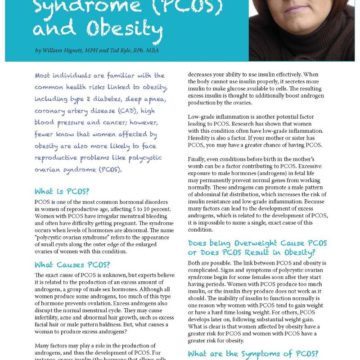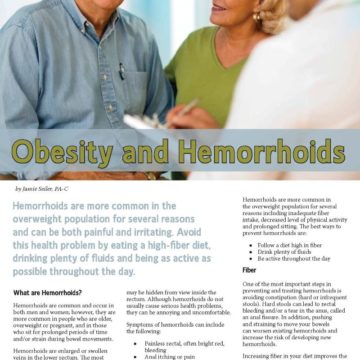Does Dramatic Weight Reduction also Reduce Cancer Risk?


by Sherman C. Smith, MD, FACS
Fall 2010
Those of us who struggle with obesity or with treating those who are, know that the overall health risk from being heavy is real. If we then have to add to this burden of risk the potential loss of life from cancer, we become even more discouraged.
Adding to this, the fact that traditional treatments of obesity have been more frustrating than successful, it would be refreshing to hear some good news when it comes to surgical treatment for obesity. That kind of news is available.
The Study
Since gastric bypass for morbid obesity has been a sound and long-practiced method of weight control, it is possible to study those patients in well designed retrospective approaches. The problem of finding appropriate control subjects was ingeniously addressed by Dr. Ted Adams at the University of Utah School of Medicine in collaboration with the Rocky Mountain Associated Physicians multi-surgeon group, who have been involved with bariatric surgery for the past quarter century.¹
Study subjects included 9,949 patients who underwent gastric bypass between 1984 and 2002 and then were followed through 2007. After exclusion of non-Utah residents, there remained 6,709 who could be linked to the Utah Cancer Registry (UCR). Controls were a group of 9,609 people who had driver’s licenses in the state of Utah, but who had not had surgery. This group was refined to include only those who could match the study group with similar age, gender and weight. They were also reviewed through the UCR, which provided information regarding cancer type and stage as well as absolute survival.
The Results
Cancer incidence and mortality in both groups were then compared. All study subjects were cancer-free at the beginning of the study. Death from cancer was found to be 46 percent lower in the surgery group. The likelihood of developing cancer in the first place was decreased by 26 percent if a patient had undergone gastric bypass. In a 24 year study (mean follow-up of 12.5 years) with this many patients enrolled using a reasonable and sound control group, the results at least deserve serious consideration.
One of the most carefully monitored prospective studies involving treatment of obesity comes from the Swedish Obesity Subject Study. This endeavor started in 1987 and matched 2,010 patients with obesity who underwent bariatric surgery with 2,037 matched controls who received conventional medical treatment alone. Dr. Lars Sjöström recently reported on the effects of surgical induced weight-loss on the incidence of cancer when compared to the control patients, who were quite rigorously monitored and encouraged through diet and exercise to achieve weight-loss.
Bariatric surgery at that time included a mix of adjustable gastric bands, vertical banded gastroplasty and gastric bypass, so there are some group differences even on the surgical side. However, when considering the overall effects of these procedures, the surgical group lost significant weight while the medical group actually gained some weight. The first-time cancer incidence was about 30 percent lower in women who had undergone surgery, but the difference in men was not significant. These results were gathered through the end of 2005, representing nearly 18 years of follow-up.²
Gastric bypass is not the only procedure for control of severe obesity, even though weight-loss with that procedure is profound. Significant weight reduction and improvement in health are noted with laparoscopic adjustable gastric bands, biliopancreatic diversion and sleeve gastrectomy.
Whether or not these procedures will lead to the same kind of improvement in cancer incidence and survival has not yet been determined. Provided patients lose weight with a given procedure and the operative risk is low, it is reasonable to expect that similar advantages would be found.
About the Author:
Sherman C. Smith, MD, FACS, has practiced general and bariatric surgery in Salt Lake City for the past 25 years. He is a graduate of Brigham Young University and received his Doctorate Degree at the University of Utah School of Medicine in 1972. He served in the US Army Medical Corps for eight years before beginning private practice.
References:
¹TD Adams, AM Stroup, RE Gress, et.al., Cancer Incidence and Mortality After Gastric Bypass Surgery, Obesity, doi:10,1038/oby.2008.610, advance online publication 15 Jan. 2009
²Sjöström L, Gummesson A, Sjöström CD, et al, Effects of bariatric surgery on cancer incidence in obese patients in Sweden (Swedish Obese Subject Study): a prospective, controlled intervention trial, The Lancet Oncology, Vol. 10, Issue 7, p. 653-662, July 2009
by Sarah Ro, MD; and Young Whang, MD, PhD Fall 2023 Mary, a postmenopausal woman with a…
Read Articleby Rachel Engelhart, RD; Kelly Donahue, PhD; and Renu Mansukhani, MD Summer 2023 Welcome to the first…
Read Articleby Sarah Bramblette, MSHL Summer 2023 In the final months of 2022, I experienced both the worst…
Read Article









